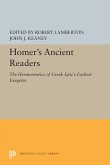The present volume comprises most of the papers delivered at RICAN 4 in 2007. The focus is placed on readers and writers in the ancient novel and broadly in ancient fiction, though without ignoring readers and writers of the ancient novel. The papers offer a wide and rich range of perspectives: the reading of novels in antiquity as a process of active engagement with the text (Konstan); the dialogic character, involving writer and reader, of Lucian's Verae Historiae (Futre Pinheiro); book divisions in Chariton's Callirhoe as prompts guiding the reader towards gradual mastery over the text (Whitmarsh); polypragmosyne (curiosity) in ancient fiction and how it affects the practice of reading novels (Hunter); the intriguing relationship between the writing and reading of inscriptions in ancient fiction (Slater); the tension between public and private in constructing and reading of texts inserted in the novelistic prose (Nimis); the intertextual pedigree of the poet Eumolpus (Smith); Seneca's Claudius and Petronius' Encolpius as readers of Homer and Virgil and writers of literary scenarios (Paschalis); the ways in which some Greek novels draw the reader's attention to their status as written texts (Bowie); the interfaces between tellers and receivers of stories in Antonius Diogenes (Morgan); the generic components and the putative author of the Alexander Romance (Stoneman); Diktys as a writer and ways of reading his Ephemeris (Dowden); the presence and character of Iliadic intertexts in Apuleius' Metamorphoses (Harrison); the contrasting roles of the narrator-translator in Apuleius' Metamorphoses and De deo Socratis (Fletcher); seriocomic strategies by Roman authors of narrative fiction and fable (Graverini & Keulen); reading as a function for recognizing 'allegorical moments' in the Metamorphoses of Apuleius (Zimmerman); active and passive reading as embedded in Philostratus' Life of Apollonius; and the importance of book reading in Augustine's 'novelistic' Confessions (Hunink).
Dieser Download kann aus rechtlichen Gründen nur mit Rechnungsadresse in A, B, BG, CY, CZ, D, DK, EW, E, FIN, F, GR, HR, H, IRL, I, LT, L, LR, M, NL, PL, P, R, S, SLO, SK ausgeliefert werden.









